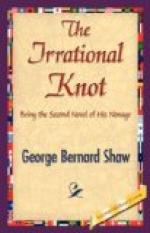In the course of time, Reginald Lind, the eldest child, entered the army, and went to India with his regiment. His brother George, less stolid, weaker, and more studious, preferred the Church. Marian, the youngest, from being constantly in the position of a guest, had early acquired habits of self-control and consideration for others, and escaped the effects, good and evil, of the subjection in which children are held by the direct authority of their parents.
Of the numerous domestic circles of her father’s kin, that with which she was the least familiar, because it was the poorest, had sprung from the marriage of one of her father’s sisters with a Wiltshire gentleman named Hardy McQuinch, who had a small patrimony, a habit of farming, and a love of hunting. In the estimation of the peasantry, who would not associate lands, horses, and a carriage, with want of money, he was a rich man; but Mrs. McQuinch found it hard to live like a lady on their income, and had worn many lines into her face by constantly and vainly wishing that she could afford to give a ball every season, to get a new carriage, and to appear at church with her daughters in new dresses oftener than twice a year. Her two eldest girls were plump and pleasant, good riders and hearty eaters; and she had reasonable hopes of marrying them to prosperous country gentlemen.
Elinor, her third and only other child, was one of her troubles. At an early age it was her practice, once a week or thereabouts, to disappear in the forenoon; be searched anxiously for all day; and return with a torn frock and dirty face at about six o’clock in the afternoon. She was stubborn, rebellious, and passionate under reproof or chastisement: governesses had left the house because of her; and from one school she had run away, from another eloped with a choir boy who wrote verses. Him she deserted in a fit of jealousy, quarter of an hour after her escape from school. The only one of her tastes that conduced to the peace of the house was for reading; and even this made her mother uneasy; for the books she liked best were fit, in Mrs. McQuinch’s opinion, for the bookcase only. Elinor read openly what she could obtain by asking, such as Lamb’s Tales from Shakespear, and The Pilgrim’s Progress.




